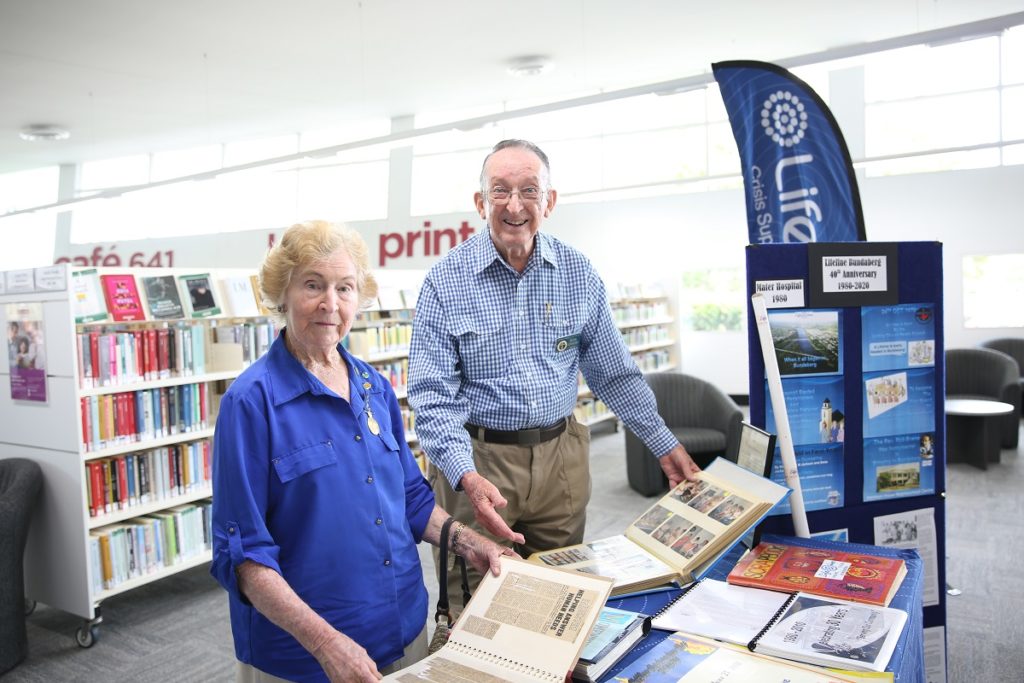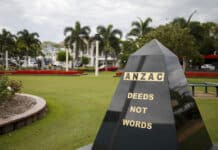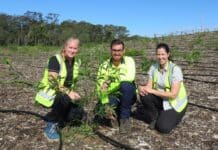
They’re the listeners at the end of the line and for 40 years Bundaberg Lifeline has been servicing the community and helping those in crisis.
Bundaberg Lifeline turns 40 on 24 October and to recognise the occasion scrapbooks full of clippings were featured at Bundaberg Library today and brought back memories of the past four decades.
The organisation was first formed in 1980 and has grown to become a 24-hour telephone counselling service which has helped countless people.
Reverend Rob Evans from the Bundaberg Uniting Church joined as director of Bundaberg Lifeline in 1983, growing the service to include more than 100 volunteers.
“Bundaberg, I think, is definitely a city that values people and when it was started Lifeline was well received,” Rob said.
“We had over 100 telephone councillors here … local people who were given the training and it helped them as people too in their daily life helping people.”
While answering calls is a 24-hour job, Rob always had grand plans to expand Lifeline into something more than just a telephone service.
In 1989 the Bundaberg Neighbourhood House was established under the auspice of Lifeline.
“I wanted Lifeline to not just be telephone counselling, and not just personal counselling but also to conduct programs for needs such as family assistance programs,” he said.
“Those programs became part of the neighbourhood centre and now the same sort of work is done with Lifeline Uniting Care and the work that they’re doing we began as the family care service in the neighbourhood centre.”
Changing people's lives
Ever since its inception in 1980, Bundaberg Lifeline has relied on volunteers to help answer calls.
According to 87-year-old Gavina McLucas, who spent 30 years as a phone counsellor, the most important part of the role is listening.
“I enjoyed it; of course there were calls you don’t want to remember, but it was the feeling of being needed and helping people,” Gavina said.
“You’re not marvellous, you’re not a specialist and you can’t tell them what to do, but you can be there for them.
“When there’s nobody else to talk to it’s good that Lifeline is there, because just to even talk to somebody can make a difference.”
Lifeline doesn't only make a difference to the people who call the crisis support line, it can also make a difference to the crisis supporters who take the calls.
“I found it very helpful to me too, and you learn things about yourself and you do all sorts of courses that help you feel better about yourself and helped you with your calls,” Gavina said.
“It’s a wonderful thing and it’s been a big help with me.”

COVID-19 challenges
Today Bundaberg Lifeline still offers a 24-hour hotline for anyone to call for support.
That support has become even more important in 2020. Bundaberg Lifeline Centre supervisor Mark Hennessy said the organisation had received unprecedented rates of calls since the start of the COVID pandemic.
“In this period of 6-8 months we’ve had the most amount of calls in Lifeline's history,” Mark said.
“More than ever we see and hear that people are wanting to feel connected because they feel disconnected and that’s the role Lifeline plays.
“Having that person on the end of the line who is going to help them through that day, that night and Lifeline's role has always been that to be there.”
If you or someone you know requires support contact Lifeline on 131 114 or Beyond Blue on 1300 224 636.
- Other news: Making a difference with Lifeline







